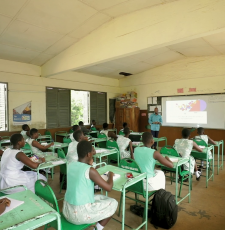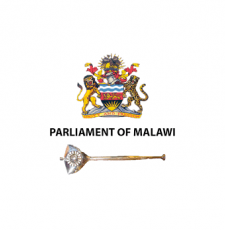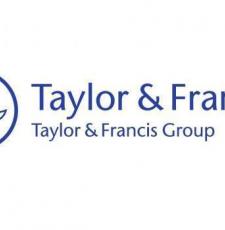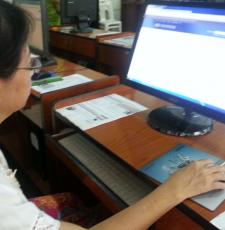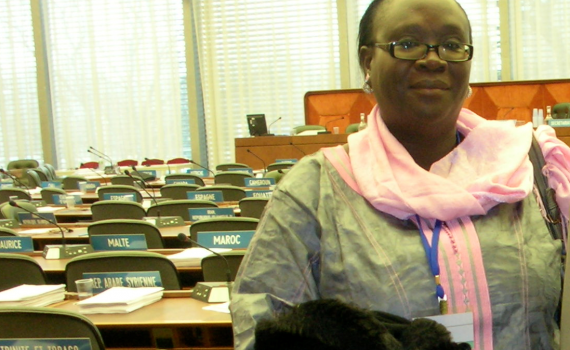
From 21 November-2 December 2011, EIFL took part in a landmark meeting at the World Intellectual Property Organization (WIPO) in Geneva. For the first time, the WIPO Standing Committee on Copyright and Related Rights (SCCR), the main body that shapes international copyright law, dedicated three extra days to libraries and archives. This was a unique opportunity to present library copyright issues - in particular for developing and transition countries - at the highest international level, to engage with WIPO Member States on substantive issues for libraries, and to advocate for the best possible results for libraries.
EIFL was represented by an experienced team: Awa Diouf Cissé from the Consortium des Bibliothèques de l' Enseignement Supérieur du Sénégal (COBESS), Barbara Szczepańska from the Poznań Library Foundation in Poland and Teresa Hackett, EIFL-IP Program Manager. Together with the International Federation of Library Associations and Institutions (IFLA), and the International Council on Archives (ICA) we are working with WIPO Member States to build support for a binding international instrument so that libraries remain effective in their ability to serve the interests of countries and their citizens in accessing and disseminating knowledge for education, learning, creativity and development.
Updates
Library and Archive Groups Delighted by Progress on Copyright Limitations and Exceptions
SCCR/23 conclusions
EIFL statement on the protection of broadcasting organizations
EIFL statement on a treaty proposal for blind and visually impaired persons EnglishFrench
EIFL presents library treaty overview at WIPO
New proposals at WIPO and EIFL delivers first statement
Brazil tables background paper on libraries at WIPO
Learn more:
A WIPO treaty for the benefit of libraries and archives, and their users
Limitations and exceptions: background and context
In support of a Development Agenda for WIPO
Timeline: limitations and exceptions for libraries and archives at WIPO
Timeline: international advoacy on limitations and exceptions by EIFL
A WIPO treaty for the benefit libraries and archives, and their users
To establish what is needed and to guide Member States in their discussions, EIFL, IFLA, ICA and Innovarte have produced a Treaty Proposal on Copyright Limitations and Exceptions for Libraries and Archives [PDF], known as TLIB. TLIB covers core issues such as library lending, interlibrary document supply, the right to make copies for preservation, education and research. It is format neutral because we believe that the public policy principles enshrined in limitations and exceptions apply regardless of the format of the material. In addition, TLIB has safeguards so that library provisions cannot be undermined by contract or technological protection measures.
In June 2011, the African Group at WIPO presented a proposal for a Draft WIPO Treaty on Exceptions and Limitations that includes libraries and archives. This is an excellent starting point for discussions. We appreciate the commitment shown by the African Group towards libraries and archives, and the other groups of beneficiaries. We look forward to engaging in a positive dialogue with all Member States at SCCR/23 to enable fair and equitable access to knowledge by libraries in developing and transition countries through a development-friendly international framework.
· Libraries and archives enrich the lives of individuals and societies [pdf]
This joint brochure by IFLA, EIFL, ICA and Innovarte provides an overview of the different types of libraries and archives, and illustrates their role for the benefit of individuals and societies.
· A WIPO treaty to benefit libraries, archives and their users [pdf]
This joint brochure by IFLA, EIFL, ICA and Innovarte explains why we need an international treaty for libraries and archives, and what is covered in our proposed treaty.
Follow us at SCCR/23
Library consortia in EIFL partner countries in Africa, Asia and Europe have been engaging with their national copyright offices to highlight the issues facing libraries, to explain the EIFL position, and to ask for their government's support during discussions at WIPO for copyright exceptions and limitations for libraries and archives.
The EIFL team, Awa Diouf Cissé, Barbara Szczepańska and Teresa Hackett are on hand in Geneva to provide information and support to government delegates during the meeting, in particular to raise issues concerning libraries in developing and transition countries. We will work closely with IFLA and other representatives from the library community to achieve the best results for libraries globally.
Follow us in Facebook and Twitter, and help spread the word!
Limitations and exceptions: background and context
Limitations and exceptions are an essential part of a well-functioning copyright system that grants legal protection for authors and creators, while at the same time provides reasonable access to society to encourage innovation, research and further creativity.
The international copyright system recognizes the role of limitations and exceptions. The Berne Convention for the Protection of Literary and Artistic Works (1886) - the first international copyright treaty - contains two mandatory exceptions (news reporting and quotations) and gives its members discretion to create limitations and exceptions for other uses, subject to certain conditions.
The 1996 WIPO Copyright Treaty and the WIPO Performances and Phonograms Treaty updated international copyright law for the digital environment. Both treaties contain important statements regarding limitations and exceptions in the digital environment. In the Preambles, the need to maintain a balance between the rights of rightholders and the larger public interest, particularly education, research and access to information, is recognized. Agreed statements affirm that members can carry forward and extend into the digital environment exceptions and limitations in their national laws, and that they may devise new exceptions and limitations appropriate in the digital network environment.
This means that countries have the flexibility to create access regimes that meet national educational, cultural and development needs. However, evidence shows that these flexibilities are often not transposed into national law for the benefit of the public. This has led to a patchwork of provisions that often do not meet the needs of libraries especially in the global, digital environment. A WIPO commissioned study Copyright Limitations and Exceptions for Libraries and Archives (Crews, 2008) confirm this trend, particularly in relation to developing countries. A study by Consumers International (2006) (consumersinternational.org/news-and-media/publications/copyright-and-access-to-knowledge) found that none of the eleven developing countries surveyed in the Asia Pacific region had implemented all the flexibilities available to them under international treaties.
At the same time, new rights have been created involving new subject matter, yet limitations and exceptions have not evolved at the same pace. In addition, licenses for electronic materials in libraries can undermine statutory limitations and exceptions, and the application of technological protections measures can prevent permitted uses. This is why we need to redress the balance with a binding international instrument.
Read more about copyright limitations and exceptions.
In support of a Development Agenda for WIPO
In 2004, several WIPO Member States led by Brazil and Argentina made a proposal to establish a “development agenda” to integrate the development dimension into all WIPO activities. Guided in particular by the UN Millennium Development Goals, the aim was to ensure that WIPO activities achieve development-oriented results.
EIFL was a supporter of the Development Agenda, and an initial signatory of the Geneva Declaration on the Future of WIPO (2004). Read more.
The Development Agenda was formally established in 2007 when the WIPO General Assembly adopted a set of 45 recommendations to enhance the development dimension of the Organization’s activities and established a Committee on Development and Intellectual Property (CDIP). The current work on limitations and exceptions addresses the Development Agenda Recommendations, in particular Cluster B: Norm-setting, flexibilities, public policy and public domain including the following:
Recommendation 15. Norm-setting activities shall:
- be inclusive and member-driven;
- take into account different levels of development;
- take into consideration a balance between costs and benefits;
- be a participatory process, which takes into consideration the interests and priorities of all WIPO Member States and the viewpoints of other stakeholders, including accredited inter-governmental organizations (IGOs) and NGOs; and
- be in line with the principle of neutrality of the WIPO Secretariat.
Recommendation 17. In its activities, including norm-setting, WIPO should take into account the flexibilities in international intellectual property agreements, especially those which are of interest to developing countries and LDCs.
Recommendation 19. To initiate discussions on how, within WIPO’s mandate, to further facilitate access to knowledge and technology for developing countries and LDCs to foster creativity and innovation and to strengthen such existing activities within WIPO.
Recommendation 22. WIPO’s norm-setting activities should be supportive of the development goals agreed within the United Nations system, including those contained in the Millennium Declaration.
EIFL supports a Development Agenda for WIPO because we believe that it will lead to a more equitable policy environment, benefiting in particular developing and transition countries. The Development Agenda is a cross-cutting issue which touches upon all sectors of WIPO, including the work of the SCCR. A proposal for a WIPO treaty on copyright exceptions and limitations for libraries supports the aspirations of the Development Agenda.
Read more about the Development Agenda.
Timeline: limitations and exceptions for libraries and archives at WIPO
The agenda item on limitations and exceptions for libraries and archives at SCCR/23 has evolved in the context of proposals submitted by several WIPO Member States since 2004. In 2005, Chile reiterated the importance of prioritizing the work of the SCCR to strengthen international understanding of the need for adequate limitations and exceptions, learning from existing models and establishing agreement on a minimum standard for exceptions and limitations for public interest purposes and the benefit of society. As a result, a number of studies were commissioned by WIPO, the Secretariat undertook an analysis of limitations and exceptions in Member States, and Member States have put forward related proposals.
2004 Proposal by Chile on Exceptions and Limitations to Copyright and Related Rights (SCCR/12/3)
2005 Proposal by Chile on the Analysis of Exceptions and Limitations (SCCR/13/5)
2008 Proposal by Brazil, Chile, Nicaragua and Uruguay for Work Related to Exceptions and Limitations (SCCR/16/2)
2008 Study on Copyright Limitations and Exceptions for Libraries and Archives prepared by Kenneth Crews, Director, Copyright Advisory Office, Columbia University (SCCR/17/2) Presentation.
The study found that libraries around the world operate under a patchwork of provisions that often restrict basic library activities. It concluded that there is a demand amongst librarians for more supportive legislation and clearer laws that would apply to the services they deliver.
2010 Updated Report on the Questionnaire on Limitations and Exceptions (SCCR/21/7)
2010 SCCR/21 Conclusions. Member States agreed on a two year work program to undertake “text-based work” on limitations and exceptions for libraries and archives, education and teaching, and persons with other disabilities. (The SCCR/23 session in November 2011 will focus on libraries and archives).
In June 2011 at SCCR/22, the African Group at WIPO presented a revised proposal for a Draft WIPO Treaty on Exceptions and Limitations that includes libraries and archives.
Also in June 2011 at SCCR/22, the United States of America made a statement on libraries and archives.
In November 2011, SCCR/23 dedicates three extra days of discussion on libraries and archives
Work on other beneficiaries is also moving ahead. In 2009, studies on limitations and exceptions for education, research and teaching across five regions were published. Then Brazil, Ecuador and Paraguay made a proposal relating to limitations and exceptions for blind and visually impaired people that aimed to resolve, in particular, legal problems regarding cross-border use of accessible materials by people with reading disabilities. Alternative proposals were submitted by other Member States which resulted in a breakthrough consensus document on an international instrument on limitations and exceptions for persons with print disabilities presented by Argentina, Australia, Brazil, Chile, Ecuador, Mexico, Paraguay, and the United States of America in June 2011 (SCCR/22/15). In November 2011, the Chair of the SCCR prepared a proposal on an international instrument (SCCR/22/16) for discussion at SCCR/23. EIFL fully supports an international treaty in favour of blind and visually impaired people, and cooperates with the World Blind Union and their allies in this regard.
Timeline: international advocacy on limitations and exceptions by EIFL
Since 2005, EIFL has been following the work of SCCR at WIPO. We have been advocating to Member States on behalf of libraries, attending key committee meetings, making interventions and presentations and providing professional advice to Member States on library related matters. Read the EIFL statements.
Librarians from EIFL partner countries including Malawi, Moldova, Poland, Senegal, Uganda, Ukraine, Zimbabwe have participated in WIPO meetings. Learn more in the EIFL Spotlight on Libraries participating in policy making.
We have been cooperating with IFLA and other library organizations to move the international agenda on limitations and exceptions for libraries forward. Several EIFL-IP librarians are members of IFLA's Committee on Copyright and other Legal Matters.
At the 2005 World Library and Information Congress participants from EIFL partner countries among others discussed developing an international library agenda for copyright, principles that guide libraries in dealing with copyright issues and specific provisions needed in copyright laws and treaties to enable libraries to fulfill their special roles in the information society.
In April 2009 at the Second Global EIFL-IP conference, librarians from thirty-nine EIFL partner countries decided to issue a statement highlighting the importance of users’ rights for libraries and education to mark World Book and Copyright Day.
In April 2009, EIFL and IFLA convened a meeting at the British Library to examine library copyright issues in detail. The result was a Statement of Principles on Copyright Exceptions and Limitations for Libraries And Archives that called for a global approach to limitations and exceptions that, in contrast to the rights of rightsholders, have not adjusted to the realities of the information work in the 21st century.
In November 2009, the EIFL Advisory Board endorsed EIFL-IP work on advancing the international agenda on copyright limitations and exceptions for libraries.
In 2011, after wide consultation with librarians, representatives of WIPO Member States and other knowledgeable individuals, a working group of IFLA - chaired by EIFL’s Teresa Hackett - developed a "Treaty Proposal on Copyright Limitations and Exceptions for Libraries and Archives" [PDF] based on the Principles for consideration by WIPO Member States.
In April 2011, the proposal was launched by Winston Tabb, chair of the IFLA Committee on Copyright and Other Legal Matters. At the same meeting, presentation by Ruth L. Okedij, University of Minnesota Law School Legal and Policy Challenges for Libraries in the Age of Digital Books.
In June 2011 at the EIFL General Assembly in Belarus, EIFL country coordinators were briefed on the limitations and exceptions agenda at WIPO by Luis Villarroel from Innovarte and on EIFL advocacy by Kathy Matsika, EIFL-IP Coordinator for Zimbabwe.
In August 2011, presentation by Teresa Hackett, EIFL at the World Library and Information Congress, TLIB: A Treaty Proposal for Libraries and Archives (ifla.org/past/ifla77/91-hackett-en.pdf)
SHARE / PRINT






